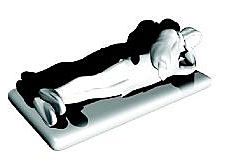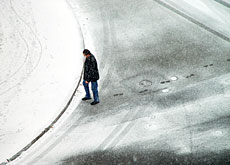Ghosts might be all in the mind

Got the feeling somebody is looking over your shoulder, but you can't see anyone? Never fear, Swiss researchers have shown it might all be in your head.
Tests on a brain-surgery patient recently revealed that stimulating part of the brain could generate this sensation of an unwelcome presence.
It’s a well-known scene at the movies. A person walks down an empty, dark and dismal street, when suddenly they get the feeling someone is lurking behind them. Turning around, they discover… nothing.
But it’s does not just happen in films. People suffering from schizophrenia often experience this type of situation, and it has also been noted in neurological patients as well as perfectly healthy people who have undergone sensory deprivation.
What neurology specialists at Lausanne’s Federal Institute of Technology and Geneva University Hospital have managed to do is perhaps find where these “ghosts” come from – albeit with a bit of luck. Their results were recently published in the science journal Nature.
They were trying to determine whether a patient suffering from severe epilepsy could undergo surgery to alleviate her seizures. Olaf Blanke and his colleagues were using electrodes surgically implanted a few days earlier to locate the source of the seizures – often lesions within the brain.
The tests are also necessary to see if surgery can be carried out safely and not affect other brain processes.
Phantom presence
Each time the neurologists applied a mild current to an area called the left tempoparietal junction (LTJ), close to the left ear, the patient, who suffered from no known psychiatric disorder, said she felt the presence of a mystery person and tried to find it.
“Some people have described it as a ghost being there, a shadow, or a real person,” Blanke told swissinfo. “What is striking is that it is always in the same spot, you are convinced it’s there, and every time you look around, there’s nobody.”
This phantom didn’t just make its presence felt. It also mimicked the patient’s body position and her gestures, and apparently tried to take away a test card during a language exercise.
Such delusions have been described previously, often as a so-called out-of-body experience (OBE). Brain researchers, including Blanke, have shown that the self can be detached from the body and exist on its own, or in other cases felt as a kind of presence.
But until now nobody had been able to reproduce this experience in a repetitive fashion. According to the researcher, the results seem to indicate that the LTJ helps with body perception.
“We don’t always correctly identify ourselves,” he added. “It’s something like telling the difference between a red and a blue car. Our brain has to tell us the difference.”
Multisensory regions
Earlier research has shown that some brain areas bring together information from several senses. Vision, hearing and touch are processed at first individually, and then combined within another region of the brain to help constitute a person’s complete perception.
The result is that visual recognition, for example, takes place much faster when an object, person or animal is accompanied by another sensory cue, such as a sound.
These multisensory regions of the brain also register perceptions of the body, such as pain, heat and cold, as well as the space around the body and subjective feelings.
“All these different types of information have to come together at some point because we only experience one body,” explained Blanke. “If you interfere as we did by stimulating the LTJ, or if you suffer from a migraine, you disrupt the coherence of the information.”
The researcher says this might explain why some schizophrenics suffer from paranoid delusions that someone is following them, although the cause of their symptoms remains unknown.
And while Blanke’s results rule out the romantic notion of supernatural forces in our midst, it won’t do any harm in putting a few ghosts to rest.
swissinfo, Scott Capper
Olaf Blanke is head of the laboratory for cognitive neuroscience at Lausanne’s Federal Institute of Technology. It is part of the school’s recently opened Brain-Mind Institute.
His previous work includes research on out-of-body experiences, which can also be created by stimulating a section of the brain.
He is assistant professor with a tenure-track position.
In 2003, he received the Leenaards Prize for his work on OBEs.
Schizophrenia is a chronic, severe, and disabling brain disorder that affects about one per cent of the Swiss population.
The term was coined by Swiss doctor Eugen Bleuler, a professor of psychiatry in Zurich from 1898 to 1927.
Among the symptoms are hallucinations that include seeing people or objects that are not there, smelling odours that no one else detects, and feeling things like invisible fingers touching their bodies when no one is near.
People with schizophrenia may also believe that others are reading their minds, controlling their thoughts, or plotting to harm them.

In compliance with the JTI standards
More: SWI swissinfo.ch certified by the Journalism Trust Initiative

You can find an overview of ongoing debates with our journalists here. Please join us!
If you want to start a conversation about a topic raised in this article or want to report factual errors, email us at english@swissinfo.ch.